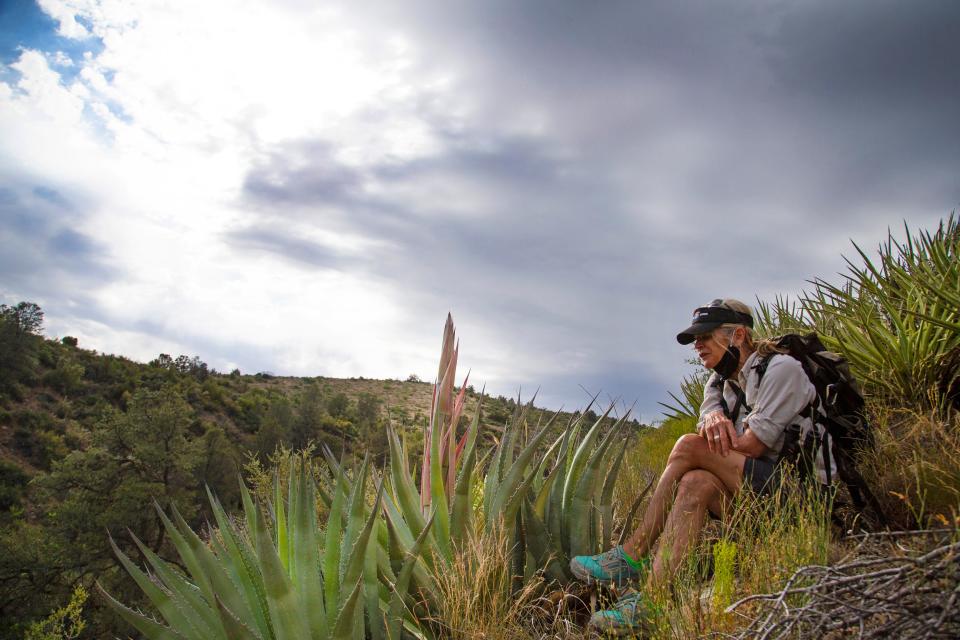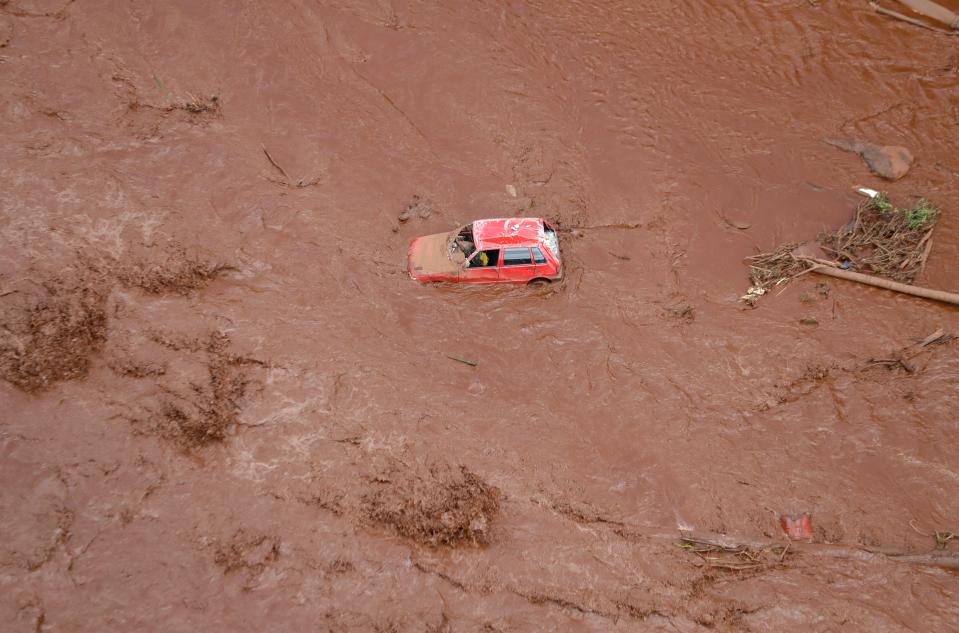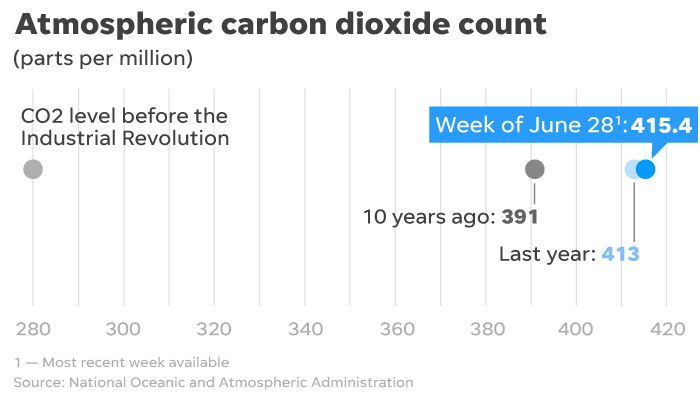Climate Point: Mining from the Amazon to Arizona
Welcome to Climate Point, your weekly guide to climate, energy and environment news from around the Golden State and the country. In Palm Springs, Calif., I’m Mark Olalde.
There's really only one place a conversation on the environment can begin this week: pipelines. There are numerous fights over the future of the pipelines that carry fossil fuels across the country, but three in particular captured national attention. And early this week, all three were dealt potentially crippling blows.
First, plans to build the Atlantic Coast Pipeline were on Sunday scrapped by the utilities behind it, USA Today reports. Then on Monday, a federal judge ruled that the Dakota Access pipeline — made famous when indigenous "water defenders" faced off against construction crews and police at Standing Rock — needs to be shut down in August because the Trump administration improperly rushed through the permitting process. The Washington Post reports on that pipeline, as well as the Keystone XL, which also suffered a court defeat this week.
And now, here's some other important reporting....
MUST-READ STORIES
A fractured revolution. America's shale revolution, built on fracking in Texas and New Mexico, promised to make the nation energy independent, support a renewed fossil fuel future and propel the country up the rankings of oil and gas exporters. In the past five years, it did exactly that but with one caveat: The math never added up. While billions of dollars of oil and gas were being pulled from the Earth, the work was so expensive it was never profitable. This was the year drillers were going to surge into the black. But they didn't, and the bust is being rapidly exposed. Bloomberg is out with a must-watch, short documentary that explains this amazing few years in American oil history.
Beef, a thirsty industry. The Guardian recently published a story digging into a new report in Nature that found cows and our all-American obsession with beef are severely drawing down the Colorado River. The numbers are staggering. Crops like hay and alfalfa that are grown to feed cattle account for nearly a quarter of all water consumption nationwide. "In the Colorado River Basin, it is over half," the story says.
All that glitters isn't gold. Mining is one of Arizona's five economic pillars — copper to be exact — and now another metal, gold, is stirring controversy. The Arizona Republic writes that two gold mining proposals are currently contested in the Hassayampa River canyon in the Prescott National Forest. If they were to receive the green light, they could threaten both an area with high cultural significance for several Native American tribes as well as a rare agave species.

POLITICAL CLIMATE
Hydrocarbon protection program. When government data dropped this week shedding light on the Paycheck Protection Program, it set off a scramble to uncover who were the true benefactors of government aid. Perhaps unsurprisingly, The Guardian found that fossil fuel companies brought in between $3 billion and $6.7 billion. The Ohio Valley ReSource dug specifically into coal companies receiving these payouts in Appalachia, finding instances of politically connected mining houses and those supporting zero employees receiving funding.
Renewables making a splash. The Department of the Interior is planning to issue several rules this month that could have big impacts on the growing offshore wind market. As has become the norm in the Trump administration, one would streamline permitting to expedite new projects, and wind companies are hopeful the move will indeed speed up the process. Utility Dive has the story.
America's most important river. There's always more Colorado River news, as roughly 40 million people depend on the might river's waters. The Interior Department must begin working on updated management plans by the end of the year, so InsideClimate News and KUNC dug into the upcoming process, specifically what lessons we can learn from studying the humpback chub. What promises to be interesting in these negotiations — besides the fact that the amount of water guaranteed among the seven relevant states and Mexico is more than actually flows through the river — is the place environmental protection could command at the negotiating table.
CHECKING IN AROUND THE WORLD

Canada's green veneer. Canada may be stereotyped as the U.S.' gentler, northern neighbor. Yet, it's believed to be home to 75% of the world's mining companies, a number of which have dismal track records on human rights and the environment. Several must-reads come out of Canada's mining sector this week, as the CBC reports in a new investigation that the country is attempting to bring back coal mining as a conservative jobs savior. Meanwhile, the Narwhal reports that disasters in which mine waste swallowed towns and snuffed out lives from Canada to Brazil have led to newly published safety recommendations.
Razing the Amazon. For Climate Home News, reporter Fabiano Maisonnave traveled deep into the heart of the Amazon to explore why far-right Brazilian President Jair Bolsonaro is hell-bent on opening up some of the world's most important ecology to mining. One answer is niobium, a metal almost exclusively supplied by the South American country. Check out this fascinating tale of how far some politicians will go to support business, even when the land they seek to develop is protected by both the law as well as indigenous people.
Damming the Nile. The Wall Street Journal reports that the political maneuverings surrounding what will be one of the world's largest dams are speeding up. Ethiopia is preparing to fill the Grand Ethiopian Renaissance Dam, which crosses a branch of the Nile, but Egypt is less than pleased and is "attempting to raise international pressure" to bring its neighbor to the negotiating table.
AND ANOTHER THING
The last tree. Capping the week with this exciting read, a team from National Geographic traveled to Tiera del Fuego, the archipelago making up the southern tip of South America. It's where the Pacific and Atlantic oceans meet in a constant maelstrom of wind and crashing waves that have shipwrecked many a wanderer. The team was in search of the world's southernmost tree that could grow in these harsh conditions, and it produces a story that speaks to humankind's unending quest to understand the world's superlatives.
Scientists agree that to maintain a livable planet, we need to reduce the atmospheric carbon dioxide concentration back to 350 ppm. We’re above that and rising dangerously. Here are the latest numbers:

That’s all for now. Don’t forget to follow along on Twitter at @MarkOlalde. You can also reach me at molalde@gannett.com. You can sign up to get Climate Point in your inbox for free here. And, if you’d like to receive a daily round-up of California news (also for free!), you can sign up for USA Today’s In California newsletter here. Seriously, put a mask on when you leave the house. Cheers.
This article originally appeared on USA TODAY: Climate Point: Mining from the Amazon to Arizona

